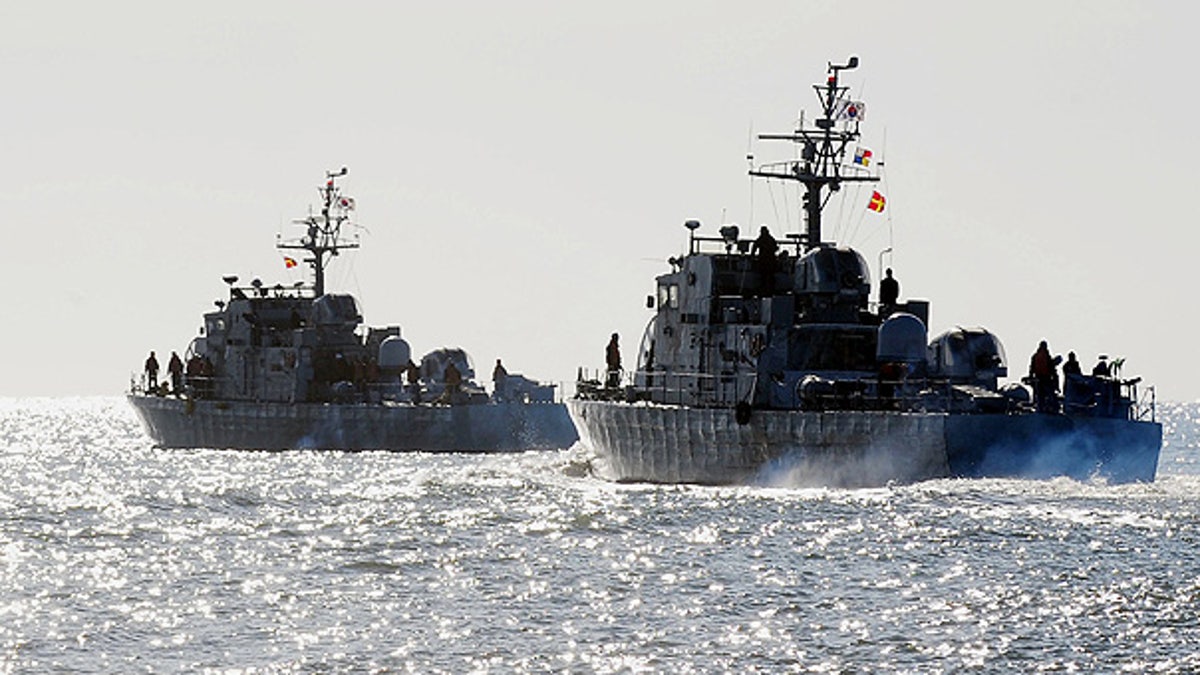
Dec. 7: South Korean Navy ships sail near Yeonpyeong Island. (AP)
SEOUL, South Korea – South Korea's president promised Tuesday to transform five islands that lie along the tense maritime border with North Korea into "military fortresses" impervious to the kind of deadly attack the rival neighbor launched last month.
As the government in Seoul struggles to counter the widespread impression its response was too weak and too slow, the new defense minister also ordered his top commanders to retaliate with force if attacked.
President Lee Myung-bak has demanded upgraded rules of engagement to allow the military to respond more forcefully to provocations since the Nov. 23 shelling of Yeonpyeong Island, a tiny enclave of military bases and fishing communities along the Koreas' disputed western sea border. He has also reinforced troops stationed on the island.
The attack — the first since the 1950-53 Korean War to target a civilian area — killed two South Korean marines and two construction workers, and reduced many homes and shops to charred rubble.
The two Koreas remain in a technical state of war because their three-year conflict ended in a truce, not a peace treaty. North Korea disputes the maritime border drawn by U.N. forces in 1953, and considers the waters around the front-line islands its territory.
North Korea said it launched its attack after Seoul refused to stop live-fire drills in the disputed waters. Similar exercises were held around the Korean peninsula Tuesday, though not in the disputed waters.
Defense Minister Kim Kwan-jin will meet Wednesday with U.S. officials led by Adm. Mike Mullen, chairman of the U.S. Joint Chiefs of Staff.
Meanwhile, the top diplomats from the U.S., Japan and South Korea met in Washington to discuss North Korea. They jointly urged Pyongyang to stop the "belligerent" behavior.
"All agree that North Korea's provocative and belligerent behavior jeopardizes peace and stability in Asia," U.S. Secretary of State Hillary Rodham Clinton said Monday.
They said they would not resume negotiations aimed at persuading North Korea to abandon its nuclear weapons program until the regime's behavior changes. Pyongyang recently revealed a uranium enrichment facility — which could give it a second way to make atomic bombs. Despite that defiance, North Korea has indicated its readiness to resume the negotiations on providing the regime with much-needed aid and other concessions in exchange for disarmament.
Regional powers have been pressing China, North Korea's main ally and benefactor, to use its influence to rein in North Korea.
"I think broadly the region, and certainly the United States, would like to see China be more influential in Pyongyang to attempt to stop the type of provocations that we've seen and ultimately assist the international community in denuclearizing North Korea," Adm. Bob Willard, commander of the U.S. Pacific Command, said in Canberra, Australia, on Tuesday.
In Beijing, Foreign Ministry spokeswoman Jiang Yu reiterated China's calls that the way forward is to resume the nuclear negotiations — called the six party talks.
"We always believe that dialogue and negotiation are the only correct way to address the Korean nuclear issue and other issues on the peninsula and realizing lasting peace on the peninsula," Jiang said Tuesday. "If the parties start talks, they will certainly find a way to resolve the issue."
Jiang added that accusations that China was enabling North Korean nuclear ambitions are "irresponsible."
Yeonpyeong Island, which went up in flames and was left a scene of destruction, is a ghost town two weeks after the attack, with most of the 1,300 civilian residents seeking refuge on the mainland and many refusing to return.
Lee said in comments posted to the presidential website that the government plans to create jobs to allow local residents to keep living on Yeonpyeong and the four other front-line islands.
Seoul has announced 30 billion won ($27 million) to help rebuild Yeonpyeong, while the city of Incheon, which has jurisdiction over the island, has requested help to modernize underground shelters and buy equipment for the fisherman who used to ply their trade on the island.
___
Associated Press writer Seulki Kim in Seoul, Anita S. Chang in Beijing and Rod McGuirk in Canberra, Australia, contributed to this report.
